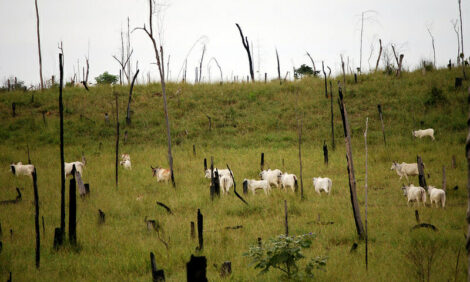



Asparagopsis now available to beef Australian producers
Asparagopsis can reduce methane emissions by over 80%According to a press release from Meat & Livestock Australia and FutureFeed, lowering methane emissions through the use of Asparagopsis seaweed as a feed supplement has become a reality, following its first commercial sale earlier this month.
The first commercial sale of Asparagopsis feed supplement in Australia by CH4 Global is a significant step forward for the industry, said MLA. Research shows that adding a small amount of Asparagopsis seaweed to a ruminant’s existing feed can reduce their methane emissions by over 80%.
The importance of this discovery towards carbon neutrality by 2030 (CN30) has resulted in industry participants working tirelessly to make the product available to producers.
FutureFeed was formed in August 2020 to commercialise the technology developed by Australia’s national science agency CSIRO, together with MLA and James Cook University. FutureFeed the company, is supported by an impressive group of investors comprising of GrainCorp, Harvest Road Group; Woolworths Group; AGP Sustainable Real Assets; Sparklabs and-Cultiv8 Joint Venture.
FutureFeed has issued licenses to seaweed growers which enables supply of Asparagopsis to the livestock market. There are currently three licensees in Australia: CH4 Global, Sea Forest and SeaStock.
Beyond licenses, FutureFeed has been busy establishing the foundations for a successful industry. This includes furthering the foundational science through research, development and trials subjected to rigorous peer-review to further support the discovery. Certification standards and a trademark are under development to ensure the robustness and credibility of the value chain.
Cassandra Kelly, Senior Advisor to FutureFeed, said the first commercial sales in Australia completed by CH4 Global was “another significant milestone” in the Asparagopsis journey.
“It’s both inspiring and humbling to reflect on how the industry has managed to engage the brains trust, community and investment support in just under four years to make a product launch like this a reality,” Kelly said.
“Just a few years ago, Asparagopsis was a largely unknown seaweed that was not cultivated in commercial quantities and had very few applications outside of niche cosmetics and as a condiment in Hawaii," she added. “Now we are seeing a new industry with the capability to support local communities and the creation of jobs whilst working together to make a meaningful impact on methane emissions from livestock.”
CSIRO Chief Executive Larry Marshall said the first commercial sale of FutureFeed was an exciting turning point for translating breakthrough science into solutions.
“CSIRO is proud to have been part of the FutureFeed journey, including going through our revolutionary ON program to accelerate the idea from bench top to business,” he said.
MLA Managing Director, Jason Strong, said emissions avoidance was a critical component of the red meat industry achieving carbon neutrality by 2030.
“MLA is continuing to work on a range of tools and technologies for producers to cost-effectively reduce emissions and increase productivity by demonstrating environmental stewardship credentials to customers, consumers and the community,” he said.
“We are proud to be working alongside FutureFeed in rolling out Asparagopsis to a range of commercial partners," Strong added. "Asparagopsis is one of many exciting tools the industry can embrace in working towards our goal of carbon neutrality at the end of the decade."


